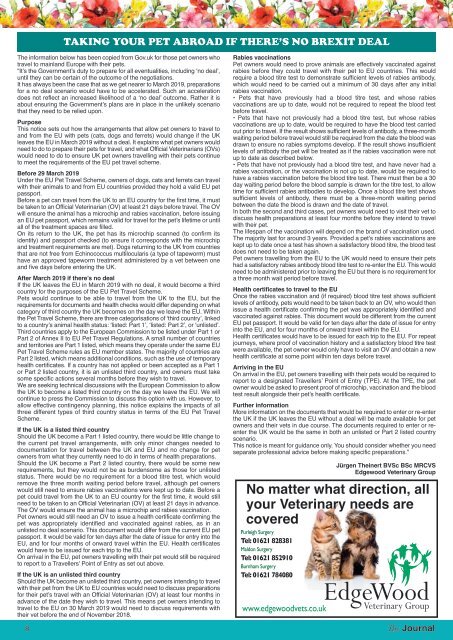Danbury NOV 2018
You also want an ePaper? Increase the reach of your titles
YUMPU automatically turns print PDFs into web optimized ePapers that Google loves.
TAkING YOUR PET ABROAD IF THERE’S NO BREXIT DEAL<br />
The information below has been copied from Gov.uk for those pet owners who<br />
travel to mainland Europe with their pets.<br />
“It’s the Government’s duty to prepare for all eventualities, including ‘no deal’,<br />
until they can be certain of the outcome of the negotiations.<br />
It has always been the case that as we get nearer to March 2019, preparations<br />
for a no deal scenario would have to be accelerated. Such an acceleration<br />
does not reflect an increased likelihood of a ‘no deal’ outcome. Rather it is<br />
about ensuring the Government’s plans are in place in the unlikely scenario<br />
that they need to be relied upon.<br />
Purpose<br />
This notice sets out how the arrangements that allow pet owners to travel to<br />
and from the EU with pets (cats, dogs and ferrets) would change if the UK<br />
leaves the EU in March 2019 without a deal. It explains what pet owners would<br />
need to do to prepare their pets for travel, and what Official Veterinarians (OVs)<br />
would need to do to ensure UK pet owners travelling with their pets continue<br />
to meet the requirements of the EU pet travel scheme.<br />
Before 29 March 2019<br />
Under the EU Pet Travel Scheme, owners of dogs, cats and ferrets can travel<br />
with their animals to and from EU countries provided they hold a valid EU pet<br />
passport.<br />
Before a pet can travel from the UK to an EU country for the first time, it must<br />
be taken to an Official Veterinarian (OV) at least 21 days before travel. The OV<br />
will ensure the animal has a microchip and rabies vaccination, before issuing<br />
an EU pet passport, which remains valid for travel for the pet’s lifetime or until<br />
all of the treatment spaces are filled.<br />
On its return to the UK, the pet has its microchip scanned (to confirm its<br />
identity) and passport checked (to ensure it corresponds with the microchip<br />
and treatment requirements are met). Dogs returning to the UK from countries<br />
that are not free from Echinococcus multilocularis (a type of tapeworm) must<br />
have an approved tapeworm treatment administered by a vet between one<br />
and five days before entering the UK.<br />
After March 2019 if there’s no deal<br />
If the UK leaves the EU in March 2019 with no deal, it would become a third<br />
country for the purposes of the EU Pet Travel Scheme.<br />
Pets would continue to be able to travel from the UK to the EU, but the<br />
requirements for documents and health checks would differ depending on what<br />
category of third country the UK becomes on the day we leave the EU. Within<br />
the Pet Travel Scheme, there are three categorisations of ‘third country’, linked<br />
to a country’s animal health status: ‘listed: Part 1’, ‘listed: Part 2’, or ‘unlisted’.<br />
Third countries apply to the European Commission to be listed under Part 1 or<br />
Part 2 of Annex II to EU Pet Travel Regulations. A small number of countries<br />
and territories are Part 1 listed, which means they operate under the same EU<br />
Pet Travel Scheme rules as EU member states. The majority of countries are<br />
Part 2 listed, which means additional conditions, such as the use of temporary<br />
health certificates. If a country has not applied or been accepted as a Part 1<br />
or Part 2 listed country, it is an unlisted third country, and owners must take<br />
some specific actions several months before they wish to travel.<br />
We are seeking technical discussions with the European Commission to allow<br />
the UK to become a listed third country on the day we leave the EU. We will<br />
continue to press the Commission to discuss this option with us. However, to<br />
allow effective contingency planning, this notice explains the impacts of all<br />
three different types of third country status in terms of the EU Pet Travel<br />
Scheme.<br />
If the UK is a listed third country<br />
Should the UK become a Part 1 listed country, there would be little change to<br />
the current pet travel arrangements, with only minor changes needed to<br />
documentation for travel between the UK and EU and no change for pet<br />
owners from what they currently need to do in terms of health preparations.<br />
Should the UK become a Part 2 listed country, there would be some new<br />
requirements, but they would not be as burdensome as those for unlisted<br />
status. There would be no requirement for a blood titre test, which would<br />
remove the three month waiting period before travel, although pet owners<br />
would still need to ensure rabies vaccinations were kept up to date. Before a<br />
pet could travel from the UK to an EU country for the first time, it would still<br />
need to be taken to an Official Veterinarian (OV) at least 21 days in advance.<br />
The OV would ensure the animal has a microchip and rabies vaccination.<br />
Pet owners would still need an OV to issue a health certificate confirming the<br />
pet was appropriately identified and vaccinated against rabies, as in an<br />
unlisted no deal scenario. This document would differ from the current EU pet<br />
passport. It would be valid for ten days after the date of issue for entry into the<br />
EU, and for four months of onward travel within the EU. Health certificates<br />
would have to be issued for each trip to the EU.<br />
On arrival in the EU, pet owners travelling with their pet would still be required<br />
to report to a Travellers’ Point of Entry as set out above.<br />
If the UK is an unlisted third country<br />
Should the UK become an unlisted third country, pet owners intending to travel<br />
with their pet from the UK to EU countries would need to discuss preparations<br />
for their pet’s travel with an Official Veterinarian (OV) at least four months in<br />
advance of the date they wish to travel. This means pet owners intending to<br />
travel to the EU on 30 March 2019 would need to discuss requirements with<br />
their vet before the end of November <strong>2018</strong>.<br />
Rabies vaccinations<br />
Pet owners would need to prove animals are effectively vaccinated against<br />
rabies before they could travel with their pet to EU countries. This would<br />
require a blood titre test to demonstrate sufficient levels of rabies antibody,<br />
which would need to be carried out a minimum of 30 days after any initial<br />
rabies vaccination.<br />
• Pets that have previously had a blood titre test, and whose rabies<br />
vaccinations are up to date, would not be required to repeat the blood test<br />
before travel.<br />
• Pets that have not previously had a blood titre test, but whose rabies<br />
vaccinations are up to date, would be required to have the blood test carried<br />
out prior to travel. If the result shows sufficient levels of antibody, a three-month<br />
waiting period before travel would still be required from the date the blood was<br />
drawn to ensure no rabies symptoms develop. If the result shows insufficient<br />
levels of antibody the pet will be treated as if the rabies vaccination were not<br />
up to date as described below.<br />
• Pets that have not previously had a blood titre test, and have never had a<br />
rabies vaccination, or the vaccination is not up to date, would be required to<br />
have a rabies vaccination before the blood titre test. There must then be a 30<br />
day waiting period before the blood sample is drawn for the titre test, to allow<br />
time for sufficient rabies antibodies to develop. Once a blood titre test shows<br />
sufficient levels of antibody, there must be a three-month waiting period<br />
between the date the blood is drawn and the date of travel.<br />
In both the second and third cases, pet owners would need to visit their vet to<br />
discuss health preparations at least four months before they intend to travel<br />
with their pet.<br />
The lifespan of the vaccination will depend on the brand of vaccination used.<br />
The majority last for around 3 years. Provided a pet’s rabies vaccinations are<br />
kept up to date once a test has shown a satisfactory blood titre, the blood test<br />
does not need to be taken again.<br />
Pet owners travelling from the EU to the UK would need to ensure their pets<br />
had a satisfactory rabies antibody blood titre test to re-enter the EU. This would<br />
need to be administered prior to leaving the EU but there is no requirement for<br />
a three month wait period before travel.<br />
Health certificates to travel to the EU<br />
Once the rabies vaccination and (if required) blood titre test shows sufficient<br />
levels of antibody, pets would need to be taken back to an OV, who would then<br />
issue a health certificate confirming the pet was appropriately identified and<br />
vaccinated against rabies. This document would be different from the current<br />
EU pet passport. It would be valid for ten days after the date of issue for entry<br />
into the EU, and for four months of onward travel within the EU.<br />
Health certificates would have to be issued for each trip to the EU. For repeat<br />
journeys, where proof of vaccination history and a satisfactory blood titre test<br />
were available, the pet owner would only have to visit an OV and obtain a new<br />
health certificate at some point within ten days before travel.<br />
Arriving in the EU<br />
On arrival in the EU, pet owners travelling with their pets would be required to<br />
report to a designated Travellers’ Point of Entry (TPE). At the TPE, the pet<br />
owner would be asked to present proof of microchip, vaccination and the blood<br />
test result alongside their pet’s health certificate.<br />
Further information<br />
More information on the documents that would be required to enter or re-enter<br />
the UK if the UK leaves the EU without a deal will be made available for pet<br />
owners and their vets in due course. The documents required to enter or reenter<br />
the UK would be the same in both an unlisted or Part 2 listed country<br />
scenario.<br />
This notice is meant for guidance only. You should consider whether you need<br />
separate professional advice before making specific preparations.”<br />
Jürgen Theinert BVSc BSc MRCVS<br />
Edgewood Veterinary Group<br />
No matter what direction, all<br />
your Veterinary needs are<br />
covered<br />
8 The Journal


















